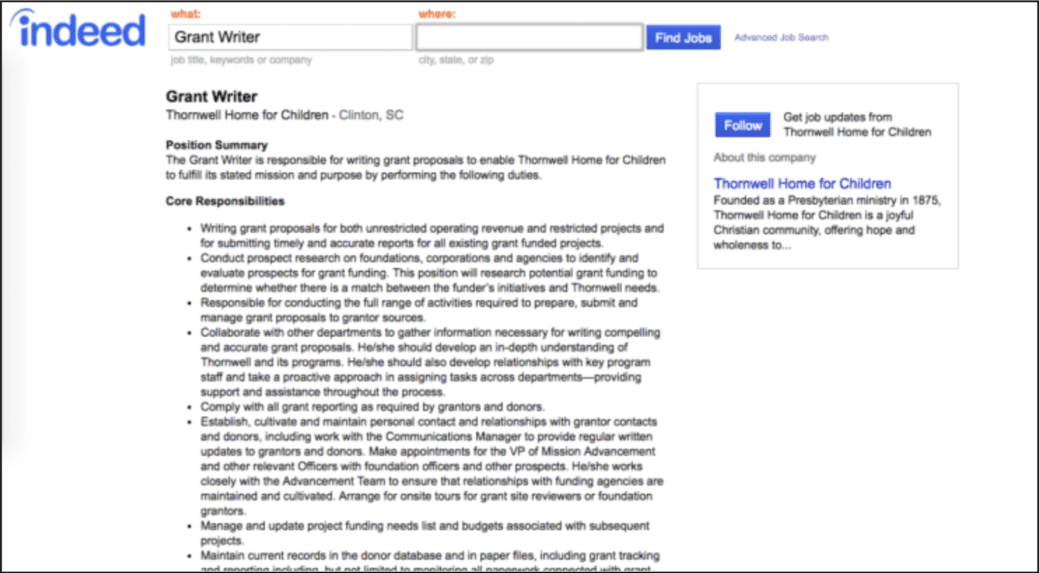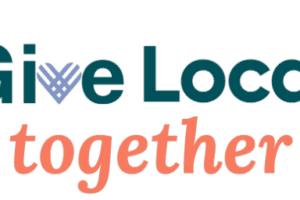Nonprofit fundraisers in organizations of every shape, size, and structure are stretched thin. If you are a fundraiser (or work closely with them), then you know that this job entails more than just mixing and mingling. There are accounts to manage, major donors to meet with, campaigns to run, donor engagement to consider, data tracking, and that’s just scratching the surface. With all that needs doing, you may be wondering where you’ll find the time and energy to hire a grant writer to help you manage the workload.
Grant writing is an essential component of nonprofit development. By hiring a dedicated grant writer to manage this project, you will set yourself up for success.
Just because you can’t find the time to research and apply for grants doesn’t mean you should just forget about this worthwhile way to supplement your budget. In fact, some nonprofit experts suggest that up to 20% of your budget be covered by grant money. Chances are, there’s a grant out there that matches with your nonprofit’s needs, you just need to find and apply for it.
Don’t let time keep you from accessing potential grant money. Consider outsourcing the grant writing process and hire a grant writer today!
There are a number of qualified grant writers out there that are bound to match your organization’s budget, desired qualifications, and timeline. Yes, the process to hire a grant writer may be time-consuming, but it’s well worth the effort! Once you find the right writer, it’s likely that you’ll collaborate on grant proposals for years to come.
Here’s a quick rundown for nonprofits and charities that want to hire a grant writer.
What Does a Grant Writer Do?
If you’re new to the nonprofit sector, or even if you aren’t, you may not be entirely familiar with the roles and responsibilities of a grant writer. For smaller nonprofits, grant writing may be one small part of someone’s larger role, such as the Development Assistant. If you’re reading this, then you’re likely considering hiring a dedicated grant writer for your nonprofit. So what will this person do?
A grant writer is responsible for researching, completing, and submitting grants in order to secure funding for a nonprofit. Grant applications vary widely in length, format, and specificity, but they generally ask writers to make a case for why a nonprofit deserves to receive awarded funds. Grant writers excel at writing compelling and persuasive applications.
Unless you already have a list of grants that you would like to apply for, your grant writer will likely research grant opportunities and get the ball rolling for each application. They will also conduct research on the needs in the community that your nonprofit serves as well as statistics that show how successful your organization is in meeting these needs.
The particular blend of research and persuasive writing required for a grant writer can make this role difficult to fill for a pre-existing member of your staff. Hiring a professional grant writer will remove this burden and place it on someone with the skills to do the job.
Why Should I Hire A Grant Writer?
We’ve already touched on how a grant writer can make life easier for your team by shifting the difficult work to a dedicated person. But besides being a good source of revenue, why are grants such a big deal for nonprofits?
Here a couple reasons why focusing on grants will help your organization:
1. Grants Grow Your Organization
Growing organizations have a range of funding needs. Generating support from different sources can both increase your organization’s revenue and provide separate pools of funding to support various efforts within the organization.
2. Grants Diversify Your Income Stream
If an organization relies too heavily on one source of funding, and that source of support disappears due to the economy, competition, etc., the nonprofit can end up in dire financial straits. Just like balancing your 401k, having different types of income streams, including grants, can help you minimize risk.
3. Grants Relieve Pressure
While some grants are quite small, most awards are significantly larger than individual donations. In fact, it’s not uncommon for grants to be tens of thousands of dollars. Also, grantors often award gifts over years (e.g., $60,000 over three years, which results in $20,000 going to the nonprofit per year), which helps make more significant program-level investments over an extended period.
What to Prepare Before You Hire a Grant Writer
To hire a grant writer, first determine whether that person will both research and apply for grants, or apply to grants already determined by your nonprofit.
If you’ve chosen the grant(s) ahead of time, then you’ll need to get your paperwork in order before you hire a grant writer. Your grant writer will need the following information to get started:
- Strategic plan
- Financials (Form 990, budgets, etc.)
- Job descriptions for positions you’re looking to fund with grant money
- Any other planning documents pertinent to the grant
- Other grants written for the organization in the past (include whether or not you received funding)
- Contact information for a point person at your organization
In some cases, the grant writer will do the research for you. If this is your plan, then outline:
- What you plan to use the grant money for
- Whether you’re interested in foundation or government grants
For example, you may need funds to cover program expenses from a government grant, or research costs from a foundation grant.
The more preparations you make in advance, the easier it will be for you to hire a grant writer when the time comes. So in addition to asking yourself whether your grant writer will work on predetermined grants or find new ones, you should also think about some of the logistics of hiring. For example, how much can you afford to spend on pay scale or salary, job posting, etc. Budget considerations can be especially important for small nonprofits with limited resources to devote to hiring a grant writer.
After you have your budget considerations determined, it may help to come up with a timeline for your grant project. This will include crucial dates, deadlines, and your meeting schedule. Make sure that your grant timeline coincides with your fundraising calendar so that you do not overbook yourself with multiple fundraising initiatives happening at once. This could leave your organization stretched too thin. Having your grant timeline in place will also help your grant writer once they are hired. With a clear timeline, they will have a firm grasp of what you are expecting of them.
TIP: Your writer will have a better understanding of your vision if you complete a SWOT Analysis. This method takes an honest look at your organization’s Strengths, Weaknesses, Opportunities, and Threats and helps you clarify the end goal.
PRO TIP: “Assess your needs before hiring a full or part time position. There are a number of freelance writers, who may be able to fulfill your grant writing needs. Freelance writers on contract, might be more fiscally responsible than bringing on additional staff.” –Adam L. Clevenger, CFRE, Loring, Sternberg & Associates
How to Find a Grant Writer
Hiring is a stressful process for every company. You may be wondering whether you’ll find qualified candidates, if they will be enthusiastic about joining your team, and a host of other considerations. These worries can be even more difficult when it comes time to hire a grant writer, as this person will be integral to your fundraising success.
Once you have your preparations finished, it’s time to think about the ideal candidate for this position. This involves asking yourself a series of questions. These questions may end up being a part of your interviews, but even if they aren’t, they are essential for you to know.
Here are a couple questions that you want to ask:
- How much and what kind of experience would your ideal candidate have?
- Do you want someone who comes with a proven success rate?
- Do you have a specific process in mind that you would like your future grant writer to follow or are you happy for them to work independently?
By asking these and other questions, you can hone in on exactly what you are looking for, which will make your search much easier.
What to Include in Your Job Ad
The next step to hire a grant writer is to craft and post the job advertisement. Start by looking at some of the job opportunities for grant writers posted on online job boards. Use a handful of great job postings to customize an advertisement for your specific job based on the needs of your nonprofit or charity.
A good ad will include:
- Description of your organization
- Summary of the position
- Job duties and responsibilities
- Desired qualifications
- Additional requirements

An example
These are some of the most popular sites to post your job opportunity:
- American Grant Writer’s Association job board
- Indeed
- Association of Fundraising Professionals job board
- Associated Grant Makers
TIP: Ask peers in your nonprofit field or community where they found their grant writers. They may be willing to suggest local sources or writers that produced results.
PRO TIP: “Network through your local Association of Fundraising Professionals chapter. You’ll be able to meet and get to know your local fundraising consultants and freelance grant writers.” –Sarah Cortell Vandersypen, CFRE, Philanthropic Partners
Where to Find Potential Grant Writers
After you post your ad, you may still struggle to hire a grant writer. So here are a couple additional options that you can pursue to broaden your search.
You can be proactive by looking for qualified candidates on freelance hiring sites like Upwork and Fiverr. Businesses around the globe rely on these these services. They can be invaluable to help find and hire skilled workers to assist with specific projects. We recommend this option if you have a tight deadline. It is also helpful for small nonprofits who don’t have the resources to bring someone on full-time.
Freelance grant writers may not have a strong connection to your nonprofit. This connection may be important to you. If so, you can try networking with your community to find a volunteer grant writer to help out. This method may require a bit more training. That is, unless you get lucky and have a grant writer who is already a donor or community member. But at least you will know that your new grant writer cares deeply for the mission of your nonprofit.
What To Look For In A Professional Grant Writer
Every nonprofit or charity requires a grant writer with different experience and traits. Therefore, an ideal applicant will vary from one nonprofit to the next. It helps to be specific about what experience, tone, area of expertise, pay rate, etc. you want.
Setting particulars aside, every grant writer should have the following six qualifications:
1. Writing Skills
This one should go without saying, but you’re not just looking for any writer to join your team. A grant writer needs to have strong research writing skills and preferably a clear and simple writing style.
2. A Proven Track Record
Don’t take a chance on a grant writer who won’t be able to deliver the results you need them to.
3. Detail-Oriented
Grant applications often include dozens of questions and specific details to include.
4. Data-Driven
Your grant writer should cite data to help build a case why your nonprofit should be awarded a grant.
5. Research Skills
Your grant writer may be called upon to research new grant opportunities for your organization.
6. People Skills
People skills will help your grant writer meet and charm potential donors. They will be more fun to work with if they are personable!
Fine tune your search by adding additional considerations, including:
- Experience in your field (human services, animal welfare…)
- Pay rate
- Shared work ethic and style (ie. organizational tools they use, able to communicate during certain hours of the workday, etc.)
After reviewing applications, including grant examples, narrow your list down to 3 candidates that meet your requirements. Then, schedule phone interviews with the remaining candidates. Once you’ve found a writer that you believe will work well with your team, contact their references to confirm their experience was a positive one.
TIP: If your nonprofit or charity is on a tight budget, you may have to sacrifice experience or industry-specific knowledge. Weigh your options carefully before choosing a candidate. You may find that you are willing to accept a candidate with only 2-years of writing experience, as long as they understand your vision and have a favorable work ethic.
PRO TIP: “When interviewing potential grant writers, be sure to investigate what type of grants they’ve written before. If you’re looking to apply to the National Endowment for the Arts (NEA), you’ll ideally want a grant writer who has secured NEA grants before.” –Sarah Cortell Vandersypen, CFRE, Philanthropic Partners
What Does it Cost to Hire a Grant Writer?
If your grant writer will be a contracted employee, you’ll need to put together a contract with the agreed-upon terms. Here’s a great example courtesy of Grant Writers.org.
Within the contract, payment should be addressed. In most cases, grant writers are paid one of three ways:
- Hourly
- A flat fee (normally per grant submitted)
- By retainer based on a predetermined amount of time
Rates will vary depending on experience. According to PayScale, grant writers earn between $18 to $34 per hour on average. Flat fees and retainers can range anywhere from $500 for a 3-4 page grant, to $15,000+ for a larger (60+ page) grant. Expect novice grant writers to charge less than writers with five or more years of experience. They may require more time for research and writing however.
Don’t forget to factor in the amount that you will spend on posting your ads and/or reaching out to recruiters to find your grant writer. Depending on the breadth of your search, this can be pricey and you don’t want to forget about the additional costs of the project.
TIP: If you’ve chosen your grant ahead of time, research or request copies of successful submissions from the funder. This will give you a good idea of the size and scope of the proposal, and allow you to budget for your writer appropriately.
Preparing Your Grant Writer And Handling Edits
Chances are, both you and your writer will come into this contract with a preferred method for handling document sharing and edits.
So, give your writer an idea of your nonprofit or charity’s SOPs (standard operating procedures) so that he/she can learn and adapt to your system. Here are a few considerations:
- Sharing Organizational Information: Consider setting up a shared drive so that your writer has access to the information necessary to complete the grant.
- Sharing the Document: You may prefer to send the original document and revisions over Google Docs, DropBox, or an online share/collaboration tool such as Asana or Trello.
- Timeline: Determine a timeline for the editing process so that the grant writer can know when to expect it back for revisions and when you need the final product.
TIP: Discuss the writing and editing process and procedures before you hire the grant writer to ensure that all parties can meet the deadlines.
Keep In Touch
You may find that your grant writer is one-in-a-million. If that’s the case, let them know you’ll be interested in using his/her services at a later date.
Keep record of your writer’s contact information, as well as any notes you’d like to have on file for a later date, such as details about the work they did for you and method of contact.
TIP: An extraordinary grant writer will be in high-demand, so don’t forget to give them a friendly heads up when you know you’ll need them to write another grant for you in the near future.Grants are a great source of income for nonprofits and charities, but they take time to research, write, and follow-up on. If you don’t have the time to handle grants yourself, hire a grant writer who can work seamlessly with you and your team. Don’t forget to have all the preparations in place so that your writer can get to work immediately and help your organization bring in additional funding!
Editor's Picks
Ultimate Guide To Peer-to-Peer Fundraising
Customer Story: Spur Local Raises Over $1M With Their Give Local Campaign
Fundraising Strategies for Nonprofits: Craft the Best Approach for Your Organization
Create a Killer Fundraising Plan - Best Practices, Strategies, & Downloadable Template



